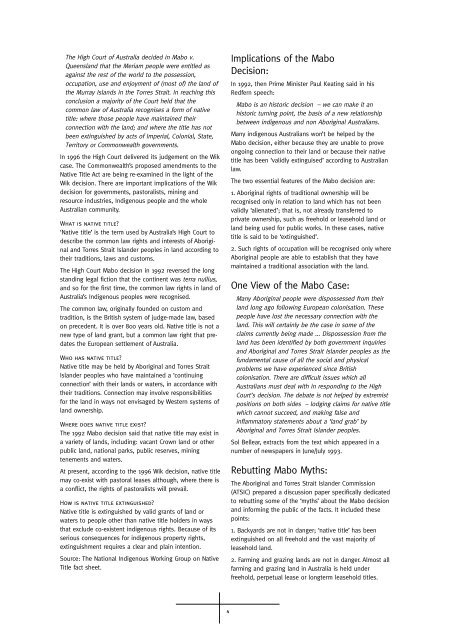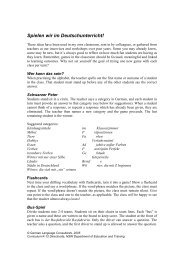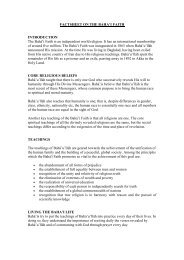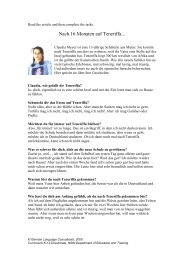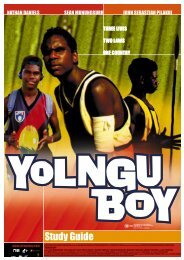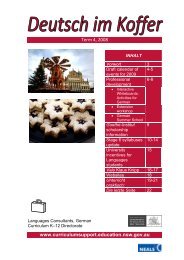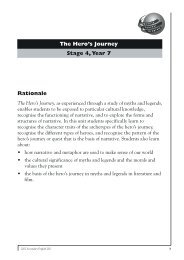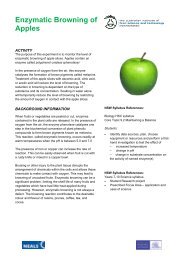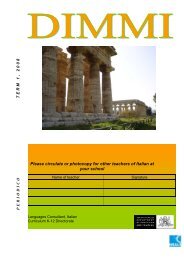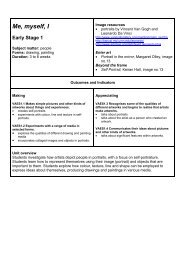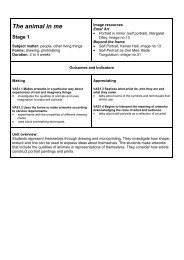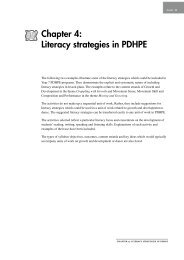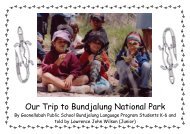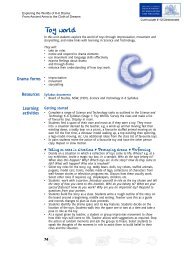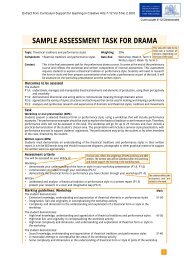Mabo Study Guide - Curriculum Support
Mabo Study Guide - Curriculum Support
Mabo Study Guide - Curriculum Support
Create successful ePaper yourself
Turn your PDF publications into a flip-book with our unique Google optimized e-Paper software.
The High Court of Australia decided in <strong>Mabo</strong> v.<br />
Queensland that the Meriam people were entitled as<br />
against the rest of the world to the possession,<br />
occupation, use and enjoyment of (most of) the land of<br />
the Murray Islands in the Torres Strait. In reaching this<br />
conclusion a majority of the Court held that the<br />
common law of Australia recognises a form of native<br />
title: where those people have maintained their<br />
connection with the land; and where the title has not<br />
been extinguished by acts of Imperial, Colonial, State,<br />
Territory or Commonwealth governments.<br />
In 1996 the High Court delivered its judgement on the Wik<br />
case. The Commonwealth’s proposed amendments to the<br />
Native Title Act are being re-examined in the light of the<br />
Wik decision. There are important implications of the Wik<br />
decision for governments, pastoralists, mining and<br />
resource industries, Indigenous people and the whole<br />
Australian community.<br />
What is native title?<br />
‘Native title’ is the term used by Australia’s High Court to<br />
describe the common law rights and interests of Aboriginal<br />
and Torres Strait Islander peoples in land according to<br />
their traditions, laws and customs.<br />
The High Court <strong>Mabo</strong> decision in 1992 reversed the long<br />
standing legal fiction that the continent was terra nullius,<br />
and so for the first time, the common law rights in land of<br />
Australia’s Indigenous peoples were recognised.<br />
The common law, originally founded on custom and<br />
tradition, is the British system of judge-made law, based<br />
on precedent. It is over 800 years old. Native title is not a<br />
new type of land grant, but a common law right that predates<br />
the European settlement of Australia.<br />
Who has native title?<br />
Native title may be held by Aboriginal and Torres Strait<br />
Islander peoples who have maintained a ‘continuing<br />
connection’ with their lands or waters, in accordance with<br />
their traditions. Connection may involve responsibilities<br />
for the land in ways not envisaged by Western systems of<br />
land ownership.<br />
Where does native title exist?<br />
The 1992 <strong>Mabo</strong> decision said that native title may exist in<br />
a variety of lands, including: vacant Crown land or other<br />
public land, national parks, public reserves, mining<br />
tenements and waters.<br />
At present, according to the 1996 Wik decision, native title<br />
may co-exist with pastoral leases although, where there is<br />
a conflict, the rights of pastoralists will prevail.<br />
How is native title extinguished?<br />
Native title is extinguished by valid grants of land or<br />
waters to people other than native title holders in ways<br />
that exclude co-existent indigenous rights. Because of its<br />
serious consequences for indigenous property rights,<br />
extinguishment requires a clear and plain intention.<br />
Source: The National Indigenous Working Group on Native<br />
Title fact sheet.<br />
4<br />
Implications of the <strong>Mabo</strong><br />
Decision:<br />
In 1992, then Prime Minister Paul Keating said in his<br />
Redfern speech:<br />
<strong>Mabo</strong> is an historic decision – we can make it an<br />
historic turning point, the basis of a new relationship<br />
between indigenous and non Aboriginal Australians.<br />
Many indigenous Australians won’t be helped by the<br />
<strong>Mabo</strong> decision, either because they are unable to prove<br />
ongoing connection to their land or because their native<br />
title has been ‘validly extinguised’ according to Australian<br />
law.<br />
The two essential features of the <strong>Mabo</strong> decision are:<br />
1. Aboriginal rights of traditional ownership will be<br />
recognised only in relation to land which has not been<br />
validly ‘alienated’; that is, not already transferred to<br />
private ownership, such as freehold or leasehold land or<br />
land being used for public works. In these cases, native<br />
title is said to be ‘extinguished’.<br />
2. Such rights of occupation will be recognised only where<br />
Aboriginal people are able to establish that they have<br />
maintained a traditional association with the land.<br />
One View of the <strong>Mabo</strong> Case:<br />
Many Aboriginal people were dispossessed from their<br />
land long ago following European colonisation. These<br />
people have lost the necessary connection with the<br />
land. This will certainly be the case in some of the<br />
claims currently being made ... Dispossession from the<br />
land has been identified by both government inquiries<br />
and Aboriginal and Torres Strait Islander peoples as the<br />
fundamental cause of all the social and physical<br />
problems we have experienced since British<br />
colonisation. There are difficult issues which all<br />
Australians must deal with in responding to the High<br />
Court’s decision. The debate is not helped by extremist<br />
positions on both sides – lodging claims for native title<br />
which cannot succeed, and making false and<br />
inflammatory statements about a ‘land grab’ by<br />
Aboriginal and Torres Strait Islander peoples.<br />
Sol Bellear, extracts from the text which appeared in a<br />
number of newspapers in June/July 1993.<br />
Rebutting <strong>Mabo</strong> Myths:<br />
The Aboriginal and Torres Strait Islander Commission<br />
(ATSIC) prepared a discussion paper specifically dedicated<br />
to rebutting some of the ‘myths’ about the <strong>Mabo</strong> decision<br />
and informing the public of the facts. It included these<br />
points:<br />
1. Backyards are not in danger; ‘native title’ has been<br />
extinguished on all freehold and the vast majority of<br />
leasehold land.<br />
2. Farming and grazing lands are not in danger. Almost all<br />
farming and grazing land in Australia is held under<br />
freehold, perpetual lease or longterm leasehold titles.


